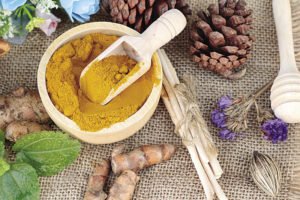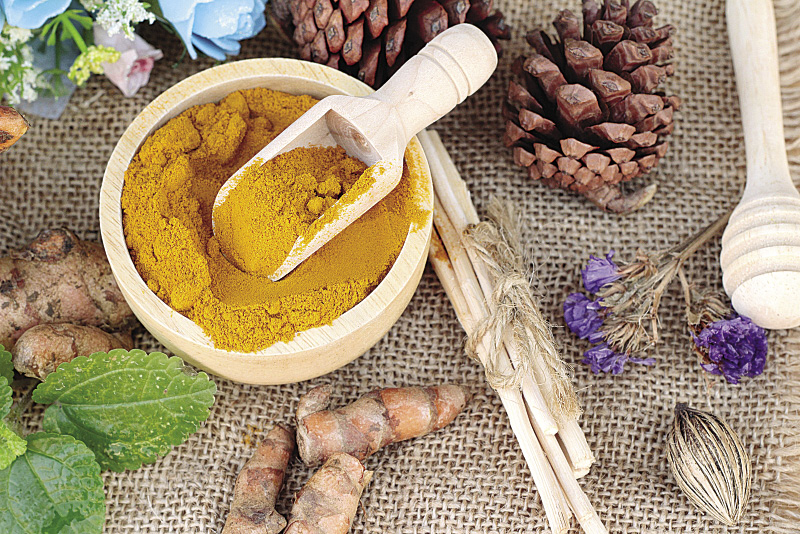There is no doubt that the herb trending right now is turmeric. Everyone seems to be expounding the miracles of this golden spice. From a simple spice popular in Indian curries, it has now blossomed as the cure-all for every ache and pain. But is there any truth to these claims?

Turmeric has been around for centuries. Traditionally called the “spice of life,” it has been used as far back as 4,500 years ago in India, where it is primarily grown. Its first big gain in popularity was around 500 BCE when it played a huge role in Ayurvedic medicine. Ayurveda is an age-old system of natural healing still practiced in India. The root of the turmeric plant was typically dried and ground to make a paste for skin conditions, burned and inhaled to relieve congestion, or consumed as a remedy for circulation, digestion, and liver problems. It also holds a sacred place in Hindu traditions, where it plays a significant role in Hindu wedding ceremonies and some still wear a piece of turmeric root as a charm to ward off evil spirits. The bright yellow color of this spice has also been used as a dye, famously used to color the robes worn by Buddhist monks.
Fast forward to 2016. We’ve been seeing research for years showing that there may be some validity to centuries of medicinal use of this root. Keep in mind that proving matter-of-factly that turmeric is of use is a difficult thing to do, as it is with all herbs. The use of herbs as natural remedies is a holistic practice, which means that the true benefits come from all of its components. Current research on the benefits of turmeric are primarily focused on one compound: curcumin. All plants contain many compounds, a holistic approach to herbal medicine is one where all compounds work together, synergistically, to bring about healing.
Inflammation: By far the most popular benefit is its ability to keep inflammation at bay. Current research into the benefits of curcumin has shown improvements in skin conditions, brain health, osteoarthritis, and irritable bowel syndrome. The most fascinating find was with Alzheimer’s disease. The elderly in India have the lowest rates of Alzheimer’s than any population in the world. Although there is still little evidence that turmeric supplementation is a benefit to those with Alzheimer’s, or beneficial as a preventative measure, Alzheimer’s does begin as an inflammatory process within the brain. We know that one of the factors that sets this group apart is that they consume turmeric on a daily basis. Although touted as a replacement for ibuprofen, the jury is still out. Yet, for centuries, people have used turmeric for relieving ailments that are associated with the inflammatory process.
Antioxidant properties: Before refrigeration, turmeric, along with other spices commonly found in curry powders, were used to prevent food from spoiling. Hence research proving turmeric is high in antioxidants, therefore showing promising results in the anti-aging arena, effective at slowing precancerous cell growth, and a helpful tool in lowering cholesterol. Curcumins in turmeric have further shown to slow the progression in colon cancer.
Digestion: There is a reason turmeric is in almost every dish in traditional Indian cuisine: it was accepted as an aid to digestion. Turmeric supports digestion by decreasing inflammation. Yet turmeric also stimulates the gall bladder to release bile, further aiding the digestive process. Those with biliary bile duct disorder, or those prone to gallstones, are warned to avoid turmeric due to this action.
Choosing to add turmeric to your life can be a challenge. Of course, food is your best choice, but quality and potency play a role in effectiveness. Powdered turmeric root in an herbal supplement is rarely more effective than simply consuming directly or adding the spice to your food. A high quality turmeric powder may contain around 2-4 percent curcumins, resulting in approximately 136 milligrams curcumins per tablespoon. If you are looking for a stronger dose, extracts are the answer. Available in both capsule and liquid form, these supplements contain around 400mg of curcumin. High quality supplemental turmeric extracts tend to include all the compounds of turmeric, not just the curcuminoids, and risk of contamination is less than with the powdered herb. Turmeric may not be the answer to all that ails you, but history and current research are all proving that adding a bit of this “spice of life” can’t hurt.






